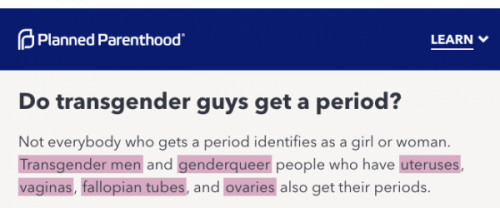Check out the important updates to the post about LGBTQ Equity Week in a suburban Chicago school district. If you haven’t read the original post, please do. You won’t believe how extreme the lesson plan is. Reader Jefferson Smith, who is a leftie, says it goes too far, and asks why parents won’t stand up against stuff like this? I wish I knew the answer. My guess is that nothing frightens middle class people more than being thought to be not respectable.
On this topic, here’s a remarkable piece that ran the other day in The Public Discourse, titled “Overruling the Visible: The Emperor’s New Gender.” The author, Margaret Harper McCarthy, talks about the case heard at SCOTUS this week, in which a male-to-female transgender person sued the funeral home who dismissed him because he said he was changing his sex to female, and began dressing as a woman. Excerpts:
What is at stake here is much more than the right of an individual to free self-expression or an employer’s freedom of religion to hold and act on such “stereotypes.” Since everyone in the workplace of that individual employee will be asked to accept that he is “a woman,” what is at stake is whether or not their—and, by extension, every person’s—pre-ideological, innate knowledge of oneself as a boy or girl, imbibed quite literally at the maternal breast, will be for all practical and public purposes officially overruled as false, a “stereotype.”
Conversely, what is at stake is whether or not the alternative will be for all public and practical purposes officially true: namely, that everyone’s “identity” is arbitrarily and accidentally related to his or her body—as ghost to machine—even if the two are “aligned” in the majority of cases, as the fashionable prefix “cis” means to suggest.
This is the metaphysical heart of transgenderism, the thing that few people commenting in public life ever talk about, preferring instead to harp on “rights.” More:
There is no question about the nihilistic objectives of the new philosophy of sex. Those objectives were already in play at the beginning of the sexual revolution. This was conceived by its founder, Wilhelm Reich, to be the most comprehensive of revolutions, because it rebelled against the very principle of reality itself, rejecting the “finalistic” notion of sexual acts. But now, in addition to obscuring the objective reality of sexual acts, “gender” would prevent us from seeing what we are—a man or a woman—or, indeed, that we are anything at all. Taking the “new clothes” of the famous Emperor in a new direction, the cloak of “gender” would render invisible all the naked evidence.
Here is the newness of the ancient attempt to extricate ourselves from the given relations in which sexual difference entangles us. It is, as Hanna Arendt said, “the knowledgeable dismissal of [the visible].” David Bentley Hart suggests a compelling reason for this. If modernity is in large part post-Christian, it cannot simply revert back to paganism and its mores. It must go further back. Since the Christian God is the One who Created all things, it must get behind everything, visible and invisible, to the only “other god” left: “the Nothing” of spontaneous subjectivity. “Gender” is precisely this: the attempt to free the will from any prevenient natural order. This could not have been more clearly stated than by Butler when she channeled Nietzsche, saying: “there is no ‘being’ behind doing, effecting, becoming . . . the deed is everything.” But it was also chillingly stated two decades before when the feminist Shulamith Firestone called for the eventual elimination of the sex distinction itself.
One cannot, of course, just will the sex distinction away. But one can try to make it conform to the new “spontaneous” will. Indeed, if the temptation to cut ourselves off from all that gave us birth gets its inspiration from radical liberationist movements, it depends on the technological manipulation of human biology for any hope of success.
Read the whole thing. Harper McCarthy has zeroed in on the unsurpassable radicalism of transgenderism, and how it requires the denial of material reality. This is how you get such crackpot things as this definition of “lesbian” from the Equity Week lesson plan: “People who love or are attracted to the same gender, often referring to women.” Because there can be male lesbians, don’t you know.
And things like this:

And things like biological males now presenting as females beating biological women at women’s sporting contests — with the women, who are at a significant physical disadvantage, having to suck it up for the sake of Progress. For example, this rather tall, muscular transwoman who won the world championship in cycling, racing against biological women:
It’s outrageously unfair to actual women, but we aren’t allowed to see what is right in front of our eyes.
In this week’s oral testimony at the Court, Justice Breyer said something interesting. From SCOTUSBlog’s recap:
Cole was followed at the lectern by John Bursch, who argued on behalf of the funeral home. Treating men and women equally, Bursch argued, does not mean that employers need to treat men as women. Bursch suggested that, if the plaintiffs prevailed, an overnight shelter for women would have to hire a transgender woman, even if some of the women at the shelter had been the victims of domestic violence or rape.
Justice Stephen Breyer dismissed what he described as Bursch’s “parade of horribles.” We are deciding, Breyer said, simply whether discrimination against transgender people falls within Title VII’s ban on discrimination “because of sex.”
Argh! The “parade of horribles” is important not because of consequentialist reasoning, but because it casts light on the real-world problems that would be caused by the Court deciding that gender theorists are right, and that the body — our male bodies and our female bodies — mean nothing. The “parade of horribles” itself is evidence against what Justice Breyer is trying to do: abstract human beings from their bodies.
There is a case coming before a district court soon, in which the defendant, charged with making a threat, is a man who presents as a woman. The man, I am told by someone working on the case, claims to be pregnant, and says he can feel the baby kicking. The sex of the defendant has nothing to do with the charge, let me be clear, and this defendant is either a nut or a troll. But I wonder: if this trans-female wanted to apply for pregnancy-related disability in a state that had strong transgender protections in its laws, on what grounds would an employer legally refuse? That a man can’t get pregnant? But this is a woman! What if a female-to-male transgender who was legally a man, but still had a uterus, got pregnant? Can “Dad” have maternity leave? Why can Dad-With-A-Uterus have maternity leave, but Penis-Having-Pop can’t?
Separate gender from sex, and it’s madness. As Ken Myers says, “Matter matters.” If you liked the Margaret Harper McCarthy essay, check out this one on transhumanism published by the scholar Mark Shiffman, in a 2015 issue of First Things. He says transgenderism and transhumanism are a modern manifestation of Gnosticism, which he describes thus:
The world is not an order of beings manifesting God’s goodness; it is rather an order of inert matter in motion, available for the human will and intellect to master and manipulate. Ancient Gnosticism sought deliverance from evil by severing the spirit’s ties to the material world. Modern Gnosticism appears at first to take a much more optimistic view of creation. Its hopes, however, are not placed in nature as created, but rather in the mind’s capacity to construct models that will unlock the powers trapped within the given order of beings, so as to release their infinite possibilities and make them subservient to our needs and aspirations. It hopes to escape evil not by fleeing the world, but by stepping away in distrust, securing the independent power of the mind through the scientific method, and then turning against the world with a vengeance and transforming it to suit the human will.
This is going to end in disaster. Let me end by recalling this passage from a blog I posted some years ago. In it, I refer to the science fiction writer Ted Chiang’s novella, “Tower Of Babylon”. It’s a story about Elamite miners in ancient Babylon who are participating in the construction of the famous tower. When the story begins, the builders have reached the vault of heaven (the story depends on ancient cosmology), and who are thinking about piercing it, even though they fear that it might bring a second deluge upon the earth. This passage jumped out at me:
Hillalum could not keep his doubts silent at such a time. “And if the waters are endless?” he asked. “Yahweh may not punish us, but Yahweh may allow us to bring our judgment upon ourselves.”
“Elamite,” said Qurdusa, “even as a newcomer to the tower, you should know better than that. We labor for our love of Yahweh, we have done so for all our lives, and so have our fathers for generations back. Men as righteous as we could not be judged harshly.”
“It is true that we work with the purest of aims, but that doesn’t mean we have worked wisely. Did men truly choose the correct path when they opted to live their lives away from the soil from which they were shaped? Never has Yahweh said that the choice was proper. Now we stand ready to break open heaven, even when we know that water lies above us. If we are misguided, how can we be sure Yahweh will protect us from our own errors?”
Men as righteous as we could not be judged harshly. Of course not.
The metaphor is that when we rise too far above the earth from which we derive, from our givenness, we call forth apocalypse.





 del.icio.us
del.icio.us
 Digg
Digg Prendendo spunto dall’ultimo interessante libro “Unisex”, scritto da Enrica Perucchietti e Gianluca Marletta per Arianna edizioni, vorrei sottolineare la pericolosissima deriva culturale, sociale e spirituale, che sta interessando l’Occidente e che contempla, tra le altre cose, la legittimazione della pedofilia. Una deriva che ha l’obiettivo di distruggere in tutti i suoi aspetti, l’uomo e la concezione che noi abbiamo di esso, per creare un Uomo Nuovo, un uomo privo di identità.
Prendendo spunto dall’ultimo interessante libro “Unisex”, scritto da Enrica Perucchietti e Gianluca Marletta per Arianna edizioni, vorrei sottolineare la pericolosissima deriva culturale, sociale e spirituale, che sta interessando l’Occidente e che contempla, tra le altre cose, la legittimazione della pedofilia. Una deriva che ha l’obiettivo di distruggere in tutti i suoi aspetti, l’uomo e la concezione che noi abbiamo di esso, per creare un Uomo Nuovo, un uomo privo di identità.